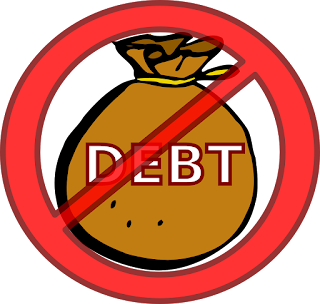Image by Clker-Free-Vector-Images from Pixabay
Tom, a young lad in his early 30’s has a good job with a good take-home Salary. Before Tom, could start enjoying his hard-earned money, he was already in a cycle of debt. A few times he borrowed to enjoy certain pleasures of life like going out to the beach or to upcountry resorts to have fun with his buddies but that cycle continued. Tom banked on some money from his employers to sort out a few of his debts and before the money could come, he still had to borrow to manage his life, pay rent, transport, and eat.
Tom’s getting into debt wasn’t necessarily intentional but
one of them was circumstantial. However, a big gaping hole has been left in his
life as he sorts out his debt problems. I encouraged him by telling him that
one good thing is, he still has a good job and that he should work with what he
has while cutting out big expenses that could dent his financial purse.
One of the biggest traps in this world isn’t just going to
jail, one of the biggest traps is debt itself. Financial enterprises like banks,
microfinance keep selling their debt products, many of them are consumer debt.
The debt is often marketed as a big-time solution to a lifestyle that people
want now, and impulsive buyers surely fall into this trap with their eyes wide
open. The marketing done by these companies is so well thought out that an
attractive image of a beautiful woman with her sleek car or a couple smiling
with their state of the art bungalow or apartments in the background is used. Surely
who wouldn’t want that kind of lifestyle, the message settles in your mind and
you start thinking maybe the easiest way to get that house, car, land, etc, is
a loan.
From his book “How to Secure a Financial Future”, Dr. Sunday Adelaja in regards to Ad companies associated with banks or credit services says, “They use the power of subliminal messaging to associate the credit card with those things. A lot of people do not think there is anything wrong with credit cards or consumer loans; it affords them the lifestyle they want. But if you have to borrow to afford your lifestyle, isn’t that a trap? It’s just a matter of time before the house of card crumbles.
Before yours truly, had started work, the talk around money
that came from every person I talked too was, “You need to get a loan”. That is
the type of financial education I was getting introduced too. However, they
wouldn’t say get a loan to develop, it would be man, we earn so little, so just
get a loan. Loans can only be good when invested, but you surely do need a
clear plan or goal for that money and you need to know that getting it is the
easy part but paying back is the real deal. There is a need for proper financial
education, people need to learn about saving, investing, debt, taxes, business,
entrepreneurship, etc. All this is missed throughout our years of education yet
learning them would make strides in grooming people who understand money and
how it works from infancy.
Anyways while talking to this friend of mine, I told him that it is good
that he is open about his situation and that that is the first step to coming
out of a debt cycle. I told him that he needs to: -
1.
Have a debt payment plan and be as open to the
people or institutions he owes.
2.
Increase his income by using his extra time (meet
a need by providing a service, product, exchange time for value, etc) to make
money that can be used to pay off his debt, For the small loans they can be
kicked off one by one as a big chunk of the money goes to clearing the bigger
debt.
3.
He needs to stick to basic spending and that
will include rent, food, and transport. He will need to sacrifice events that
take out a lot of money, such money can be channeled to clearing the debt.
4.
For any increment in his pay, the increment can
be channeled to investment because we all know salary can do as much and that
he needs to grow his money to have financial peace going forward.





No comments:
Post a Comment